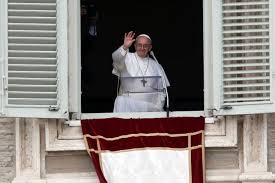Books: Pope Francis's controversial past

ROME-Pope Francis's embryonic papacy has been fresh air for many Catholics-The enthusiastic extrovert, impatient of formality, eager to preach and practice the essential message of God’s untiring forgiveness and predilection for the poor could not be more at odds with the gloomy rigour of Pope Benedict’s inward-looking reign.
Many hope he will succeed in flinging open the windows and sending a vivifying wind through the stale air of the Curia, blowing away the spiritual cobwebs and the poison-pen papers of the Vatileaks saga.
Pope Francis had barely appeared on the balcony of St Peter’s Basilica to wish the crowd a cheery “buona sera” when elements of his own controversial past, in the Argentina of the “Dirty War” against communism, began to swirl through the media. As national head of the Jesuit order, Jorge Mario Bergoglio had colluded with the military dictatorship in the arrest and torture of two of his own priests, the press reported. The two had aroused suspicion by working with the poor in the Buenos Aires slums and had defied the authority of an inexperienced but autocratic Bergoglio, who had ordered them to desist. That Bergoglio was a very different man from the later archbishop of Buenos Aires, who himself spent much of his time ministering to the slums, and then Pope, who advocated a “poor church for the poor” and led by personal example.
For those baffled as to how these two different characters could share the same biography, an instant book by the British Catholic journalist Paul Vallely offers a plausible explanation. ‘Pope Francis, Untying the Knots’ draws on research in Rome and Buenos Aires to paint a convincing portrait of a complex man who underwent a radical spiritual conversion to become the person he is today, a process that makes him a peculiarly authentic testimonial for the importance of divine forgiveness. Vallely quotes from an interview that Bergoglio gave as archbishop, in which he makes it clear that his self-definition as a sinner is not just a figure of speech: ‘Today I ask forgiveness for the sins and offences that I did indeed commit.”
Vallely provides a detailed account of Bergoglio’s troubled relationship with his imprisoned confrères, Orlando Yorio and Franz Jalics. But he also describes the geo-strategic context in which the conflict took place. “His opposition to Liberation Theology was very much rooted in the mindset of the Cold War and the fear that atheistic communism would supplant both capitalism and Catholicism in Latin America,” Vallely writes. With the end of the Cold War and the globalisation of the economy Bergoglio came to think differently about extreme poverty and to revise his view of Liberation Theology.
Documents from the time of the Falklands War, recently released by the British government, cast new light on the way strategic considerations influenced Vatican diplomacy. In June 1982 Archbishop Achille Silvestrini, the Vatican’s equivalent of a foreign minister, made a secret appeal to the British government to refrain from inflicting a military humiliation on the Argentinians for fear of precipitating the fall of the military junta and potentially opening the door to Soviet influence in the country. The Vatican hoped “that we could inflict on Argentina defeat sufficient only to ensure that President [Leopoldo] Galtieri fell from power and that the remainder of the junta stayed,” the documents record. It was not an easy situation for the temperamentally conservative Bergoglio, caught between Vatican realpolitik and the plight of his obstinate slum-working priests.
After the restoration papacy of the dainty Pope Benedict, with its precious emphasis on tradition in liturgy, dress and theology, we have an outward-looking Pope eager to embrace the peripheries of the world, from the handicapped in St Peter’s Square to the slum dwellers of Rio. We have gone from Benedict’s camauro, a medieval hat that, Vallely says, “would look at home on one of Santa’s gnomes”, to the etiquette-busting thumbs-up sign given by Pope Francis on his first tour of St Peter’s Square in an open-topped jeep. As Vallely puts it: “A sense was abroad that, after the thin sunlight of a long dry Catholic winter, spring may at last be arriving.”
Vallely concludes his book by quoting the once-banished Liberation Theology proponent Leonardo Boff: “What matters isn’t Bergoglio and his past, but Francis and his future.” But if one wants a better understanding of that past, then ‘Untying the Knots’ is a good place to start.
‘Pope Francis, Untying the Knots’ By Paul Vallely, Bloomsbury. 218 pages. £12,99.
Philip Willan is the author of ‘The Vatican at War, From Blackfriars Bridge to Buenos Aires’, published by www.iuniverse.com.


